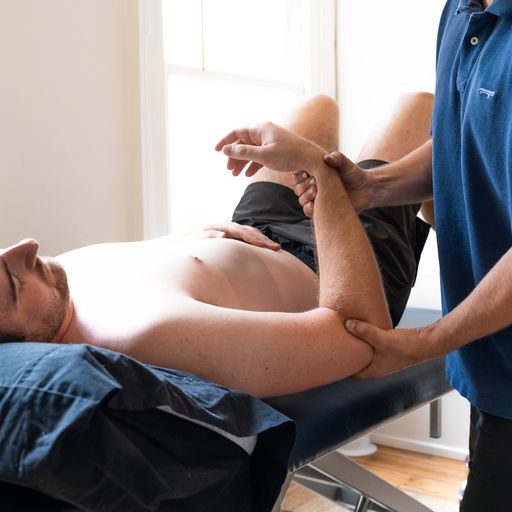Can Osteopathy Help Tennis Elbow?
Table of Contents
- Introduction
- What Is Tennis Elbow? 2.1 Signs and Symptoms 2.2 Common Causes
- How Osteopaths Treat Tennis Elbow 3.1 Manual Therapy for Pain and Tension 3.2 Exercise Rehab and Load Management 3.3 Strength & Conditioning for Long-Term Relief
- Whole-Body Assessment and Contributing Factors
- Osteopathy for Office Workers, Tradies, and Athletes
- Why Choose Principle Four Osteopathy in Melbourne CBD?
- FAQs About Osteopathy for Tennis Elbow 7.1 Can osteopaths treat chronic or recurring tennis elbow? 7.2 Do I need to stop work or sport during treatment? 7.3 How many treatments will I need? 7.4 Will I get exercises to do at home?
- Author
Introduction
Tennis elbow—also known as lateral epicondylitis—is a painful condition affecting the outer part of the elbow, often caused by overuse or repetitive strain. Despite the name, it’s not just limited to tennis players. Office workers, manual labourers, gym-goers, and musicians are all commonly affected.
At Principle Four Osteopathy in Melbourne CBD, we provide comprehensive care for tennis elbow by combining hands-on treatment with exercise-based rehab, load management, and strength development.
What Is Tennis Elbow?
Tennis elbow involves micro-tears and inflammation in the tendons that attach to the lateral (outer) part of the elbow, most commonly the extensor carpi radialis brevis tendon.
2.1 Signs and Symptoms
- Pain or tenderness on the outer elbow
- Pain with gripping, lifting, or twisting
- Stiffness or weakness in the wrist and forearm
- Discomfort during repetitive hand movements
2.2 Common Causes
- Repetitive lifting or gripping
- Prolonged keyboard or mouse use
- Improper gym or sports technique
- Sudden increase in load or activity
How Osteopaths Treat Tennis Elbow
3.1 Manual Therapy for Pain and Tension
Your osteopath will use a combination of techniques to reduce pain, ease muscle tension, and promote circulation. These may include:
- Soft tissue massage to the forearm and triceps
- Joint mobilisation of the elbow, wrist, and upper back
- Myofascial release techniques
- Taping or bracing for temporary support
3.2 Exercise Rehab and Load Management
Recovery from tennis elbow requires progressive loading of the tendon. We guide you through:
- Eccentric and isometric tendon loading exercises
- Forearm and grip-strengthening drills
- Gradual reintroduction to daily tasks, gym work or sport
We also review work or training patterns that may be contributing to the issue.
3.3 Strength & Conditioning for Long-Term Relief
Once pain is managed, building strength and endurance is key. This includes:
- Scapular and postural strength training
- Core and shoulder stability work
- Grip control and wrist mobility drills
This holistic approach ensures your elbow isn’t just pain-free—but stronger and more resilient.
Whole-Body Assessment and Contributing Factors
We assess more than just your elbow. Often, tennis elbow is aggravated by issues elsewhere in the body:
- Poor shoulder or neck mobility
- Weak scapular muscles
- Desk or tool-related postural stress
- Grip technique when lifting or training
Your osteopath may assess your workstation, lifting form, or sport technique as part of treatment.
Osteopathy for Office Workers, Tradies, and Athletes
Tennis elbow can affect:
- Office workers – from hours of keyboard and mouse use
- Tradespeople – due to repetitive tool use and heavy lifting
- Athletes – especially tennis, CrossFit, weightlifting and racquet sports
Our Melbourne CBD team tailors care to your lifestyle and functional demands, with a strong focus on keeping you active while managing symptoms.
Why Choose Principle Four Osteopathy in Melbourne CBD?
- Expert care for tendon and overuse injuries
- Manual therapy + exercise rehab = comprehensive treatment
- Workplace and sports-specific guidance
- Easy access in the heart of the city at Level 4, 178 Collins Street
We help you manage pain, regain function, and reduce recurrence risk—all in a clear, supportive plan.
FAQs About Osteopathy for Tennis Elbow
Can osteopaths treat chronic or recurring tennis elbow?
Yes. We often work with clients who’ve had symptoms for months or years, using progressive rehab and hands-on care to improve outcomes.
Do I need to stop work or sport during treatment?
Not always. We help modify activities to reduce strain while maintaining strength and function.
How many treatments will I need?
It depends on the severity and duration of symptoms, but most clients begin to feel relief within 3–5 sessions and continue rehab over a few weeks.
Will I get exercises to do at home?
Absolutely. Your rehab program is an essential part of recovery, and we’ll support you with progressions as you improve.
Author
Heath Williams
Principal Osteopath | Ergonomic Consultant | Strength Coach
With 15+ years of experience, Heath helps clients recover from overuse and tendon injuries with a combination of manual therapy, rehabilitation, and performance-based care.
Internal Links:
